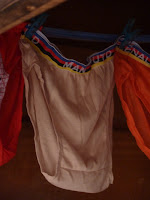Predictably everyone here supports Manchester United, Liverpool, Chelsea and Arsenal. I was Mzuzu’s only Aston Villa fan until this week when a Liverpool fan said she was happy to give up and support Aston Villa instead. We’ll see how far her loyalty extends when she realises that we’re not exactly on a winning streak! Football is a big part of life here. Most minibuses and a lot of cars have team affiliated decoration of some sort and every football shirt for the ‘big 4’ teams that ever got taken to a charity shop is lovingly worn even when the logo has disintegrated long ago. Mzuzu has three teams in the top Malawi league - Moyale (the soldiers); Eagle Strikers (the police) and Jukebox (the err collective set of randoms put together this season by a jukebox company owner). I aligned myself with Moyale seeing as I live close by and play netball there. I have spent 4 Saturdays at Mzuzu Stadium watching the games. It’s slightly different to the Premiership in that the entrance fee is 45p and rather than a Balti pie the mainstay snacks are a bag of groundnuts (5p) or a lollipop (9p). At half time in the local Police v Army derby the referee had an army and police guard stand by him. However this is over dramatic as the behaviour of the Malawi fans is MUCH better than it is in the UK. They might all stand up when there’s an incident but sit down again immediately when the action restarts so everyone can see. There is very little shouting at the ref or shouting at all really. All the fans mix in together and are very laid back. The Manchester United of Malawi are MTL Wanderers – they are based in Blantyre in the South of Malawi but just like Man U and Manchester lots of people support them even though they’ve never visited Blantyre, oh and I suppose they do tend to win things. Their fans were the most gregarious dancing and singing and one of them strangely waving a dictionary for the whole game. Luckily Moyale held them to a 1-1. Transfers take on a different meaning for the Mzuzu teams as unfortunately the police and soldiers could be transferred to a different barracks or station in the country at any time and will have to hope that there is a decent side there to play for.
The Malawian national side is called ‘the Flames’. They had a crucial African cup qualifier against Chad the other week. The country was poised on a Saturday afternoon to watch. I was in the market and wondering why everyone was listening on the radio rather than watching on TV. I learned later that the President had decided to give a speech instead and so MBC (Malawian Broadcasting Corporation) had been obliged to show that rather than the scheduled football. Not a way to win popularity especially when Malawi stormed to a 6-2 victory.





